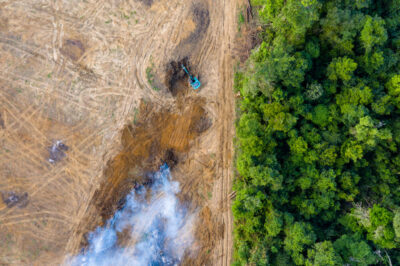Main content
At the moment of writing, the Covid-19 pandemic has, once again, tightened its grip on European society. The Netherlands has entered another lockdown, and the Omicron Variant of Concern has led countries to impose entry restrictions, especially for travellers from Southern Africa. The public debate is focused on the need for increasing vaccination coverage, booster regimes, testing options, and amend-ing the digital green Covid-19 certificate so as to safeguard public health outcomes and health system integrity (notably intensive care beds capacity), while keeping the economy afloat. Public authorities were and are busy deciding whether Christmas markets can remain open, and whether European citizens can still plan holiday trips and restaurant visits dur-ing this winter season. I have difficulty with this rather narrow and shallow debate on how to address the pandemic. My unease is rooted in the observation that we are trying to address symptoms, but completely over-looking the diagnosis and systematic disease it represents. The Covid-19 pan-demic did not emerge out of the blue. It revealed a broken system of economic hyper-globalisation. The pandemic dem-onstrates the interconnection between humankind, animals and other living beings on the one hand and the envi-ronment on the other. Deforestation, climate change and the ever-increasing destruction of natural life, resource-intensive lifestyles, and unsustainable food production and consumption systems have been the root cause of the emergence of zoonoses since the beginning of the new millennium.[1] The declining biodiversity, linked to indus-trial agriculture and intensive livestock breeding, is a major driver of spill-overs of infectious diseases: the devastation of forests for palm oil plantations enabled the ecological conditions for the spread-ing of Ebola and Nipah viruses. These can now more easily ‘jump’ the species barrier between bats and humans.[2] Covid-19 is therefore one more manifestation of the Anthropocene.
The earth-system scientist Johan Rockstrom points out that the Covid-19 pandemic should make us recognise that we are moving beyond the point of planetary saturation.[3] At the open-ing of the World Health Organization (WHO) Global Conference on Health and Climate Change – organised in the context of the COP26 United Nations Climate Change Conference in Glasgow – WHO Director General Tedros declared “Climate change is a health crisis“. He also stated that a failure to address pandemics and climate change as complex interrelated issues is likely to lead to false pre-paredness and response strategies.[4]
The planetary health appeal
The international public health com-munity has, over the last years, taken a much-needed interest in the inter-relations between climate change and health outcomes. This is evident in academic publications such as the Lancet Countdown on health and climate change [5]. In the Netherlands, health professionals, practitioners and researchers have established the ‘Zorg voor Klimaat’ (Care for Climate) network.[6] We are witness-ing an expanding, transdisciplinary, academic and educational planetary health community.[7] The Belgian Platform for International Health recently organised a climate justice and health equity conference.[8] Likewise, in the Netherlands there is new atten-tion and synthesised evidence on the interrelation between climate change and (public) health outcomes.[9]
Despite all these efforts, there is still an elephant hiding in the room which needs to be tackled head-on in order to enable the urgently needed transforma-tional change. The elephant is known as ‘capitalist economic growth’. Many of the policies and concepts that form the basis of among others the sustainable development goals, the planetary health discipline, and current pandemic pre-paredness and response plans are built on an (implicit) assumption of the possi-bility of an ‘inclusive and green growth’ approach. Often this is embedded in an innovative and ‘technology savvy’ digital project, e.g. a smartphone app that enables the sharing of electronic bikes, rapid diagnostic tests for malaria, etc.
To quote critical research on the planetary health paradigm:
“Based on a depoliticised and ahistori-cal conception of the ecological crisis, it naturalises capital and the technosci-ences. Instead of focusing on limits – physical and natural, moral and political – that humanity could set in its relation-ship to nature and to itself, Planetary Health proposes instead to push these limits further through a techno-finan-cial resilience that celebrates our ability to emerge from the crisis through a new cycle of capitalist accumulation.“[10]
Degrowth and health
With this political-economic under-standing of health and the biomedical sciences in mind, I have been fortunate to work over the last years with a rela-tively small community of researchers, students and activists (the Commons Network) on a different health and care discourse. This can be summarised as a post-growth movement, one that merges alternative planetary health concepts with feminist economics and com-muning practices in the care domain. One of the key questions that this community asks is the following: If a growth-centred economic system is making us and the planet sick, what can we do to transform it? In a new report published by the Commons Network, we explore what it means to move beyond growth, towards a vision of society and health that is centred around three core values: care, autonomy, and sufficiency.[11]
The degrowth movement representing these values has its roots in the 1970s and enables us to unlearn that economic growth is desirable.[12] This presents a different expression of the economy as a social construct, as a means rather than a goal in itself. The Commons Network provides a space where communities have autonomy, steward resources collectively, and initiate activity, com-munication and democratic steward-ship. By focusing on community life, localising economic activities, and using resources in a more sustainable manner, the act of organising healthcare through Commons promotes a shift to a more ecological economy, one more in line with degrowth’s core value of sufficiency. The report by the Commons Network provides case studies of autono-mous citizen’s (social and health) care initiatives in the Netherlands. There, self-organised care works because it is local and often place-based, but also because it is freed from the bureaucratic government system. Focusing on recip-rocal caring practices means moving away from transactional relationships in a community, away from the ethic of productivity and individualism, and towards an ethic of non-exploitation.[11]
Contemporary degrowth research and healthcare activities often use European ‘commoning’ examples as an entry point, but actually they are rooted in (often valuable) lessons from non-Euro-pean contexts. These lessons, although each deserves an article on its own, can be summarised in three points. First, in public health, we need to actively challenge the (unspoken) issue of supremacy and discrimination in international collaborations, as power-ful positions, finance and leadership are mostly still dominated by global health practitioners from high-income countries. Black, indigenous, and other people of colour, often women, are the real leaders of global public health and their wisdom needs to be given prior-ity in decolonising this domain.[13]
Secondly, the rather narrow reductionist biomedical approach, so much fostered and replicated by European actors else-where, must give space to plurality, diver-sity and holistic forms of knowledge and concepts of what health and wellbeing entails. This could include traditional, indigenous and valuable socio-cultural visions on how to respect human, plane-tary and economic limits, thereby reach-ing a much more balanced, healthy and harmonious mode of living together.[14]
Lastly, through international medical, development and corporate practices we should, as a core value and principle, take notion of “first, do no harm“. Let’s apply this to the ongoing pandemic and what is required to prevent and respond to this and future public health emergencies in a just manner. Such ethical values would imply support-ing a temporary waiver of intellectual property rights of vaccines and other medical products during the time of the pandemic. However, even during this crisis, the monopolistic capitalist model of medicines research and development (R&D) and production continues to be dominated by Western pharmaceutical companies, governments and philan-thropies. Such monopolies hinder the development of vaccines as a global common good.[15] In addition, to coun-teract the drivers of zoonotic spill-over and pandemic risks, there is a need to push for strong (global) regulations on the practice of intensive agrobusi-ness and industrial farming, and on the export of harmful processed (fast) food, soda, alcohol and tobacco prod-ucts.[1] This would require the health and medical community to challenge corporate interests and address the commercial determinants of health.
Imagining the limits of biomedical economic growth
All this is not magical thinking. It has been proposed by many. It’s an antidote to the illogical myth of capi-talism and endless economic growth. We can become transformative, heal our wounds, and enable societal and ecological repair. We can find a different narrative and story. For this, we need to empower our imagination beyond the rigid economic fetishism of con-sumerism, marketing, branding and medicalisation (also known as the secu-ritisation of health) of societies. There are alternatives and possibilities for reciprocal learning. This is in essence an ethics of limits. Let us work within the safe space of the life essentials and needs that people require, while respecting the planetary boundaries within which life can take place.[16] Let us start a movement of ‘limitarianism’ in biomedicine, and thereby give space to health, care, and ecological wealth.[17]
References
- Wallace R. Big farms make big flu: dispatches on influenza, agribusiness, and the nature of science. New York: NYU Press; 2016. 400 р.
- Khetan AK. Covid-19: why declining biodiversity puts us at greater risk for emerging infectious diseases, and what we can do. J Gen Int Med. 2020 Sep;35(9):2746-7. doi: 10.1007/s11606-020-05977
- Rockstrom J. Safeguarding a climate – towards a sustainable future [lecture] [Internet]. Kapuscinski Development Lectures. 2021 Oct 6. Available from: www.kapuscinskilectures.eu/lectures/safeguarding-a-climate-towards-a-sustainable-future/
- WHO [Internet]. Geneva: World Health Organization; 2021. 2021 Global Conference on Health and Climate Change; 2021 Nov 6. Available from: www.who.int/news-room/events/detail/2021/11/06/default-calendar/2021-global-conference-on-health-and-climate-change
- Romanello M, McGushin A, Di Napoli C, et al. The 2021 report of the Lancet Countdown on health and climate change: code red for a healthy future. Lancet. 2021 Oct 30;398(10311):1619-62. doi: 10.1016/S0140-6736(21) 01787-6
- Zorg voor Klimaat [Internet]. Over ons. Available from: www.zorgvoorklimaat.nl/over-ons/
- Planetary Health Alliance [Internet]. Boston: Planetary Health Alliance. Planetary Health. Available from: www.planetaryhealthalliance.org/planetary-health
- Be-casue Health [Internet]. Antwerpen: Be-cause Health. 23 & 24 November: Climate justice and health equity; 2021 Nov 9. Available from: www.be-causehealth.be/en/bch-news/23-24-november-climate-justice-and-health-equity/
- Quarsie J, Van de Pas R, Fanoy E, et al. De impact van klimaatverandering op gezondheid in Nederland: de nieuwste inzichten. Ned Tijdschr Geneeskund. 2021 Sep 1;165:D6245
- David P-M, Le Dévédec N, Alary A. Pandemics in the age of the Anthropocene: is ‘planetary health’ the answer? Global Public Health. 2021 Aug-Sep;16(8-9):1141-1154. doi: 10180/17441692.2021.1893372
- Commons Network [Internet]. Commons; 2018. Van Woerden W, De Groot T. Living well on a finite planet. Building a caring world beyond growth. 2021 Nov 19. Available from: www.commonsnetwork.org/news/new-report-out-now-building-a-caring-world-beyond-growth/
- See for instance the following report: DH, Randers J, Meadows DL, The limits of growth (1972). In: Robin L, Sörlin S, Warde P, editors. The future of nature: documents of global change. New Haven: Yale University Press; 2013. p. 101-16. doi.org/10.12987/9780300188479-012; The original works and reports by the Club of Rome (1968): Club of Rome [Internet]. Zurich: Club of Rome; 2022. Publications. Avaialble from: www.clubofrome.org/publications/; Illich I, Limits to medicine: medical nemesis: the expropriation of health. 1973
- Abimbola S, Pai M. Will global health survive its decolonisation? Lancet. 2020 Nov 21;396(10263):1627-8. doi: 10.1016/S0140-6736(20)32417-X
- Loewenson R, Villar E, Baru R, et al. Engaging globally with how to achieve healthy societies: insights from India, Latin America and East and Southern Africa. BMJ Glob Health. 2021 Apr;6(4):2005257. doi: 10.1136/bmjgh-2021-005257
- Van de Pas R, Widdowson MA, Ravinetto R, et al. COVID-19 vaccine equity: a health systems and policy perspective. Expert Rev Vaccines. 2021 Nov 25;1-12 doi: 10.1080/14760584.2022.2004125. Online ahead of print
- Raworth K. A doughnut for the Anthropocene: humanity’s compass in the 21st century. Lancet Planet Health. 2017 May:1(2):e48-e9. doi: 10.1016/S2542-5196(17)30028-1
- Robeyns I. What, if anything, is wrong with extreme wealth? Journal of Human Development and Capabilities. 2019;20(3):251-266



















































